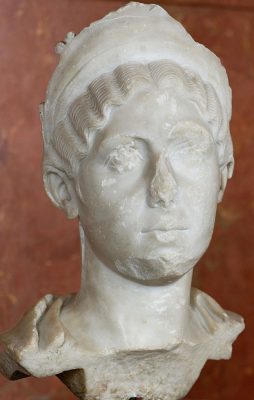Julia Avita Mamaea was born around 190 AD in Emesa, Syria. She was the daughter of an influential woman named Julia Maesa and a Syrian nobleman, Julius Avitus. She had an elder sister named Julia Soaemias. Mamaea married Gessius Marcianus, and in 208, they had a son named Alexianus.
In 217, Caracalla was stabbed to death by his own soldier and then replaced by his praetorian prefect, Macrinus. At this time, Mamaea’s mother, Julia Maesa, plotted to overthrow Macrinus. She started brewing rumors that Julia Soaemias’ son, Varius Avitus Bassianus, was a bastard son of Caracalla and, therefore, had a divine right to the throne. This eventually led to Macrinus’ downfall. Bassianus then ascended the throne in 218 and was renamed Elagabalus after the Syrian sun god.
Rise to Power
Elagabalus turned out to be a negligent ruler. His popularity began to sink when he introduced his god, Elagabal, in place of the Roman god, Jupiter. Soon, even his influential grandmother, Maesa, disliked him. Maesa then started positioning Mamaea’s son, Alexianus, to be the next emperor, to replace Elagabalus.
Elagabalus’ unpopularity eventually led his praetorian guards to kill him and his mother, Soaemias. Their heads were cut off, and their bodies were dragged in the streets. As a result, Mamaea’s son, Alexianus, became emperor of Rome in 222 at the age of fifteen and was given the new name Severus Alexander.
Maesa helped Mamaea establish her son’s rule, organizing a group of sixteen senators to guide the young emperor. They also chose a well-known jurist named Ulpian as praetorian prefect. Severus Alexander’s guidance became popular with the public, with Mamaea assuming a dominant role as her son’s strongest influence. With the death of Maesa, she received titles like “Mother of the Camp” and “Mother of the Senate.”
Mamaea soon arranged for Alexander to be married to Sallustia Orbiana, a daughter of a Roman patrician. However, Mamaea became envious when Orbiana has conferred the title of Augusta, while her father received the title of Caesar. Despite Alexander’s objections, she had Orbiana banned from court and her father killed. These events led the public to look at Alexander as unmanly and a mama’s boy. Some historians, who knew Alexander’s impotence under his mother, even called him “Alexander Mamaeae.”
Mamaea’s control over the empire began to slip when Persia acquired newfound strength. When Ardashir rebelled and toppled the Persian king, Artabanus, he founded the aggressive Sassanian Empire. Due to his popularity, Ardashir amassed a strong following. He set his sights on Rome, and in 230, he attacked Mesopotamia.
Alexander and Mamaea then ordered a counter-attack the following year. During the war, Alexander found himself accused of cowardice and indecision. A three-branched attack had been aimed at the Persians, with the northern branch already killing many enemy soldiers. Alexander hesitated when his turn came to attack the enemy with the central branch. His hesitation eventually resulted in many deaths in the southern branch, leading to criticisms about his manhood again.
Death
To add to Alexanders’ troubles, the regions along the Rhine were again under attack from the Germanic tribes. Alexander prepared his troops, but Mamaea told him not to attack and use diplomacy instead. Alexander obeyed his mother, and accusations of weakness again flew toward him. When his troops found out that Alexander’s diplomacy consisted of simply bribing the Germans to stay away, they turned furious. The bribes only meant less pay for them as there would be no battles to fight. Talks of rebellion went around, and soon, a general named Julius Verus Maximinus was declared emperor by his legion. Other emperors would have marched his troops to crush the rebellion, but Alexander sobbed and whimpered upon standing in front of his troops. He sniffed back tears as he branded Maximinus a traitor. Having never seen such a sight and perhaps out of pity, his men muttered vows of loyalty. However, when Maximinus’ troops neared, Alexander’s men chased him into a tent. They found him clinging tight to his mother, Mamaea, whom he blamed for all his troubles. The soldiers murdered mother and son, then proclaimed Maximinus as emperor.
